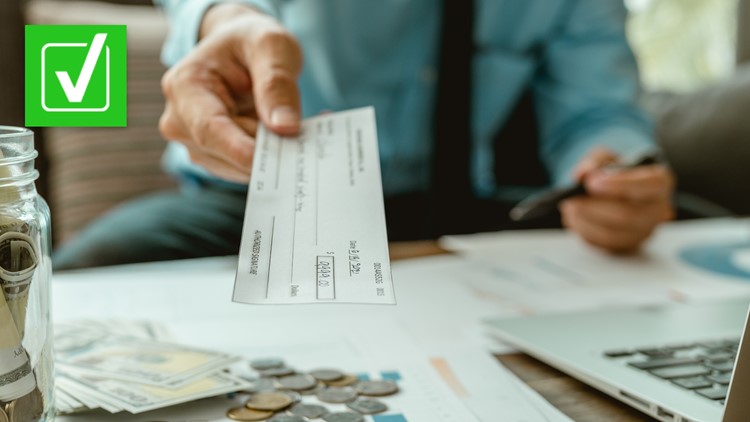Paper check usage has been declining for several years in the U.S., and the Federal Reserve Bank of Philadelphia predicted that paper checks would become obsolete by 2026. However, some people still use them to pay for goods and services.
A VERIFY reader recently emailed our team asking if a personal check she found from 2001 was still good to cash or if checks can expire.
THE QUESTION
Do personal checks expire?
THE SOURCES
THE ANSWER
Yes, personal checks typically expire after 180 days, or six months.
WHAT WE FOUND
Personal checks typically expire after 180 days, or six months, after the date on the check. However, some banks may accept older checks. If you have an expired or “stale” check, you should contact the issuer and request a replacement.
Banks are legally obligated to honor a personal check for up to six months under the Uniform Commercial Code (UCC), according to Capital One, Chase Bank and Huntington National Bank. The UCC is a comprehensive set of laws that govern commercial transactions in the U.S.
Most personal, business and payroll checks are generally valid for up to 180 days, or six months. However, some businesses have “void after 90 days” pre-printed on their checks, according to Huntington.
“Most banks will honor those checks for up to 180 days and the pre-printed language is meant to encourage people to deposit or cash a check sooner than later,” Huntington says.
Capital One says checks with an issue date older than six months are known as “stale checks” and financial institutions aren’t legally required to cash them. But some banks may cash or deposit them at their own discretion if they believe the funds are still available.
“Keep in mind that if there aren’t enough funds to cover the check, you could run into issues with a bounced check and related fees. Waiting too long could also result in the payer stopping payment on the check,” Capital One says.
The six-month rule doesn’t apply to every type of check.
Checks issued by the federal government usually carry an expiration date of one year, Chase and Huntington both say. But expiration dates for checks from state or local governments may vary.
“By law, U.S. Treasury checks are good for one year after the date on the check. This means that federal tax refund checks are good for one year as those are issued by the U.S. Treasury. After that time, you’re still entitled to money the government owes you,” Huntington says.
Expiration dates for cashier’s checks also vary based on state or local laws.
“It’s generally a good idea to cash a cashier’s check before the expiration date printed on it, if there is one,” Capital One says.
Certified checks, traveler’s checks and money orders typically don’t expire, according to Capital One. However, if you don’t cash a money order within one to three years, a fee may be assessed.
If you have an expired or “stale” check, all of our sources recommend contacting the person, business or government agency who issued the check to request a new one.



